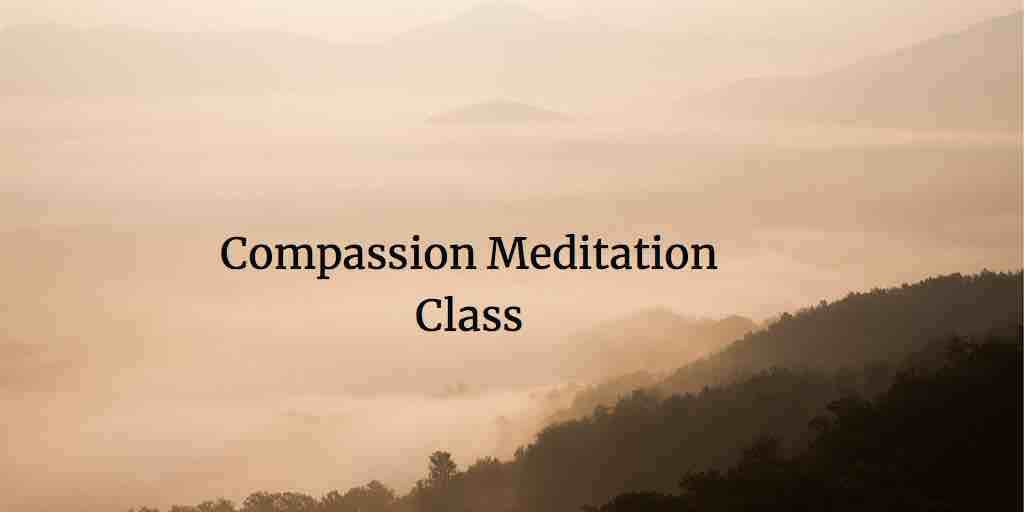Compassion Meditation Class
05 Apr, 2023

"What is Compassion Meditation?"
"Benefits of Compassion Meditation Classes"
"Why Choose Our Compassion Meditation Program?"
"How to Get Started with Compassion Meditation Classes"
"Join Our Compassion Meditation Community"
Welcome to our Compassion Meditation Classes, where you'll embark on a transformative journey toward greater empathy, self-compassion, and inner peace. Our expert-guided sessions offer you a path to cultivate compassion, reduce stress, and enhance your overall well-being.
What is Compassion Meditation?
Compassion meditation, also known as "metta" or loving-kindness meditation, is a mindfulness practice focused on developing feelings of compassion and goodwill toward yourself and others. It involves repeating positive affirmations and imagery to foster a sense of empathy and kindness.
Benefits of Compassion Meditation Classes:
Enhanced Empathy: Learn to understand and connect with others on a deeper level.
Reduced Stress: Alleviate stress and anxiety by promoting relaxation and emotional balance.
Improved Relationships: Foster healthier relationships through increased compassion.
Self-Compassion: Develop a kinder, more forgiving attitude toward yourself.
Greater Inner Peace: Find serenity and tranquility amidst life's challenges.
Why Choose Our Compassion Meditation Program?
Experienced Instructors: Our skilled instructors bring years of expertise and a deep understanding of compassion meditation.
Structured Curriculum: Our classes follow a well-structured curriculum suitable for beginners and experienced practitioners.
Supportive Community: Join a community of like-minded individuals on the journey to compassion and mindfulness.
Flexible Scheduling: We offer flexible class schedules to accommodate your busy life.
How to Get Started with Compassion Meditation Classes:
More in detail below
Compassion is the ability to understand and empathize with the suffering or difficulties of others and to take action to alleviate their pain or improve their well-being. It is a fundamental aspect of our humanity and has a significant impact on individuals, communities, and society as a whole. Here are some ways in which compassion is powerful:
Enhances Emotional Well-being: Compassion not only benefits the person receiving it but also the one offering it. When we practice compassion, our brains release oxytocin, a hormone that promotes feelings of love and connection. This can lead to increased happiness, reduced stress, and improved overall emotional well-being.
Strengthens Relationships: Compassion is a cornerstone of healthy relationships. It fosters trust, understanding, and cooperation. When we show compassion to others, they are more likely to reciprocate, creating a positive feedback loop that strengthens bonds.
Promotes Altruism: Compassion often inspires acts of kindness and altruism. When individuals feel empathy and compassion for those less fortunate, they are more likely to engage in charitable actions and volunteerism. This can have a positive impact on the community and society as a whole.
Reduces Conflict: Compassion can be a powerful tool in resolving conflicts. When individuals approach disagreements or disputes with understanding and empathy, it can lead to more peaceful and constructive resolutions.
Improves Mental Health: Compassion-focused practices, such as loving-kindness meditation, have been shown to reduce symptoms of depression, anxiety, and PTSD. Cultivating compassion for oneself and others can promote mental well-being.
Fosters a Sense of Belonging: Compassion helps people feel connected to one another. It reinforces the idea that we are all part of a shared human experience, which can combat feelings of isolation and loneliness.
Drives Social Change: Compassion can be a powerful force for social justice and positive change. It motivates individuals and groups to advocate for the rights and well-being of marginalized or oppressed populations.
Promotes Forgiveness: Compassion can lead to forgiveness, both of others and oneself. It allows people to let go of resentment and anger, promoting healing and reconciliation.
Creates a Kinder World: When compassion becomes a cultural norm, it can lead to a more compassionate and empathetic society. Acts of kindness and understanding ripple through communities, making the world a better place for everyone.
Enhances Physical Health: Studies have suggested that practicing compassion can have positive effects on physical health, including reducing inflammation and improving cardiovascular health. Stress reduction through compassion can also have a positive impact on the immune system.
Guided Mindfulness Meditation (20 minutes):
Begin with a short mindfulness meditation to ground participants in the present moment.
Guide participants in focusing on their breath, sensations, or a point of concentration to cultivate mindfulness.
Teaching Compassion Meditation Techniques (30 minutes):
Explain and demonstrate different compassion meditation techniques, such as loving-kindness phrases, visualization, or breath-focused compassion.
Provide tips on dealing with distractions and maintaining focus during meditation.
Address common challenges that may arise during the practice and how to approach them with compassion.
Guided Compassion Meditation (20 minutes):
Lead participants through a guided compassion meditation session.
Encourage participants to direct feelings of compassion towards themselves, loved ones, acquaintances, and even challenging individuals.
Emphasize a non-judgmental attitude and openness to the experience.
Group Reflection and Sharing (15 minutes):
Open the floor for participants to share their experiences during the guided meditation.
Encourage discussion on challenges, breakthroughs, and any insights gained.
Facilitate a supportive and non-critical environment for sharing.
Closing and Resources (10 minutes):




